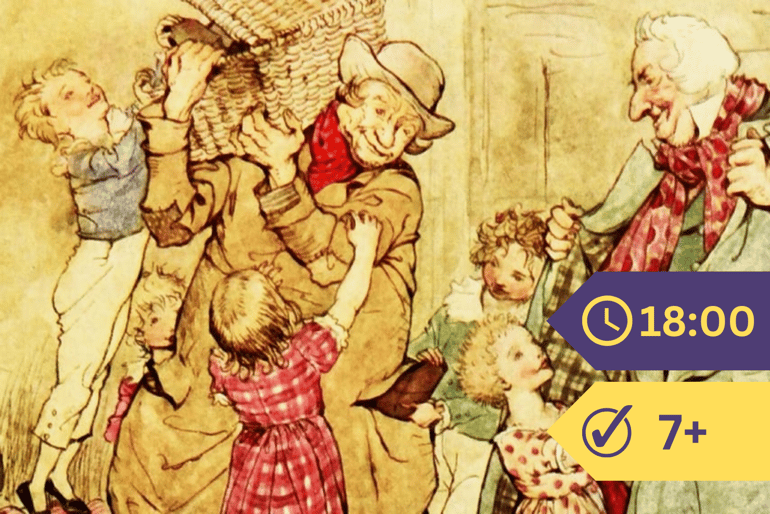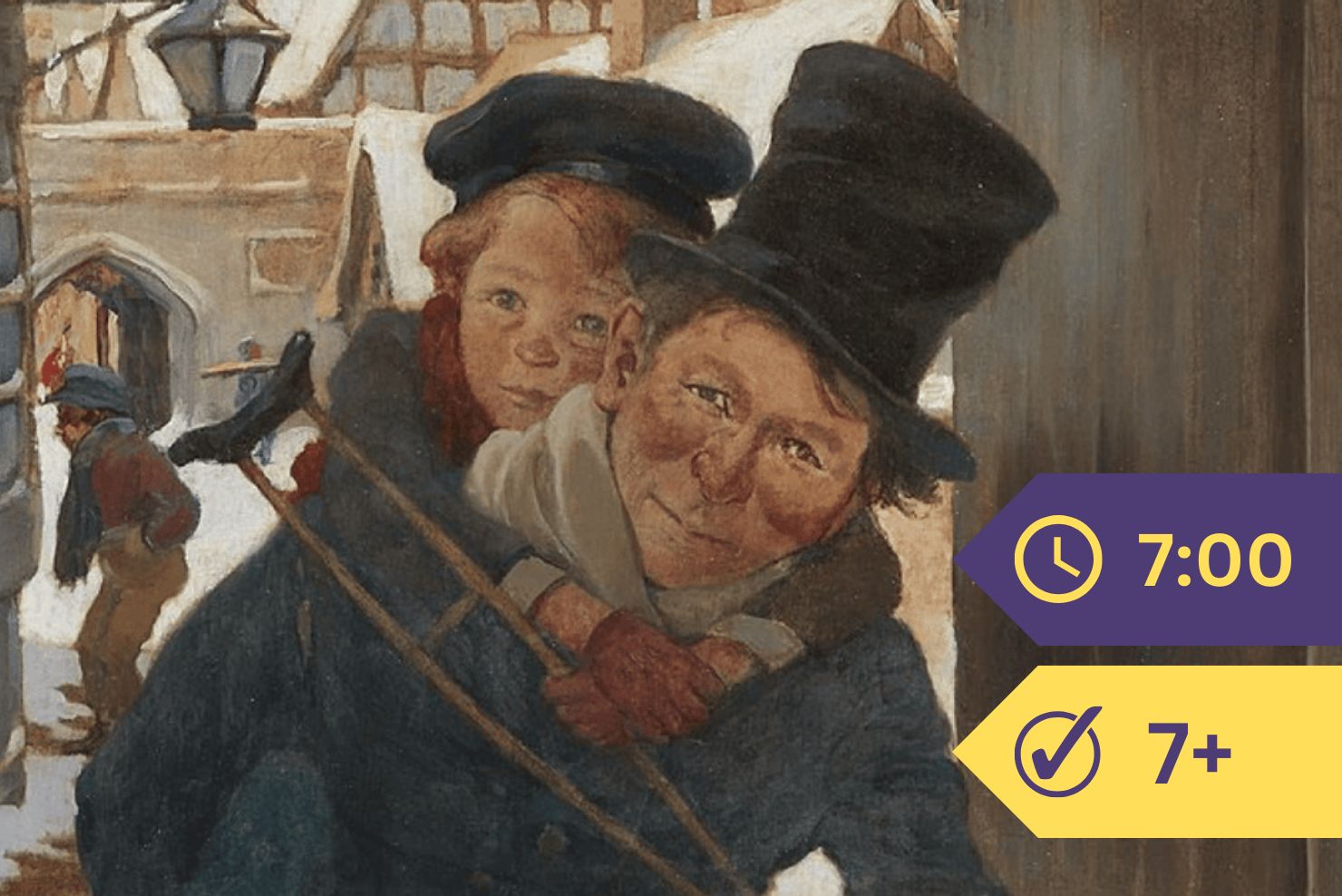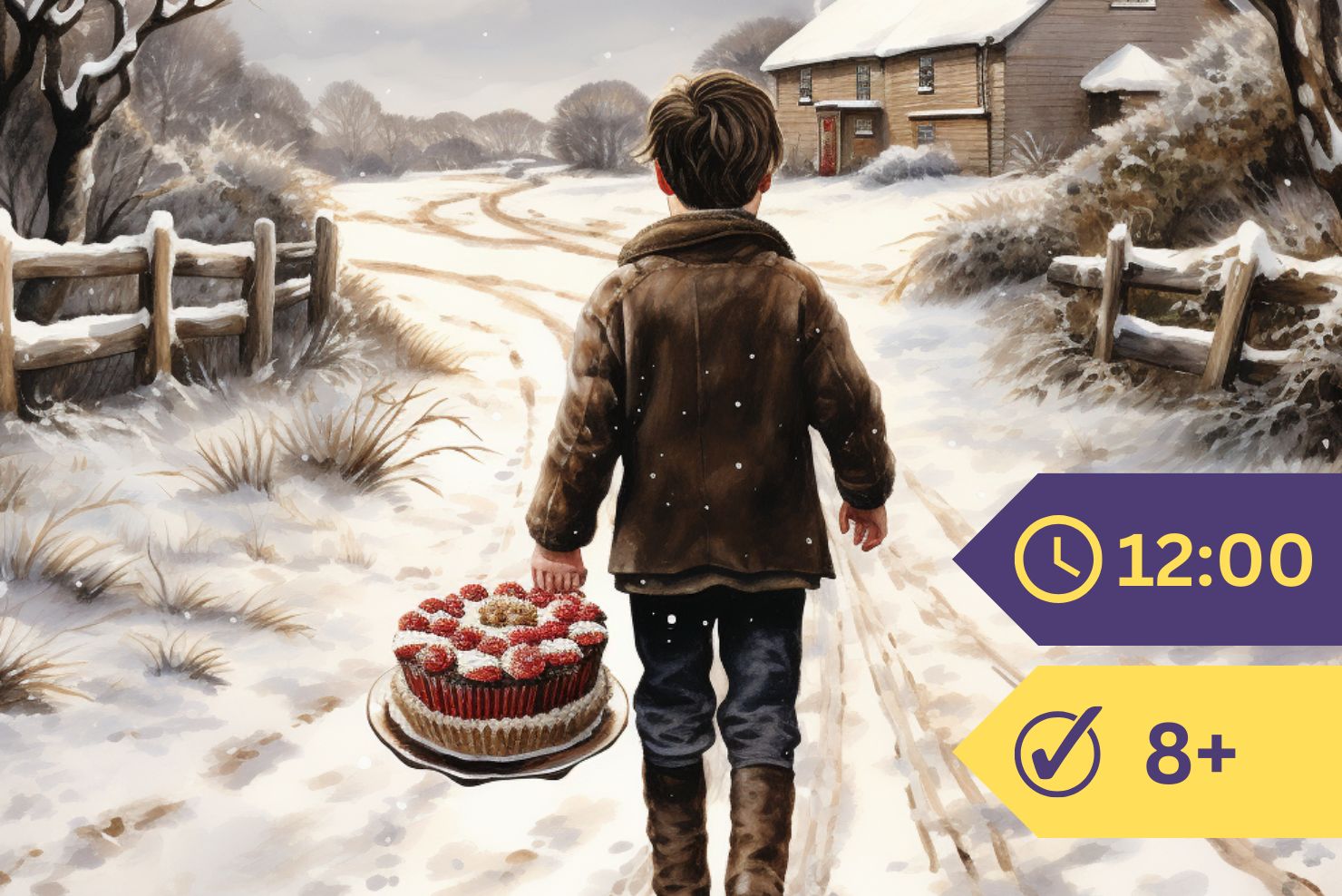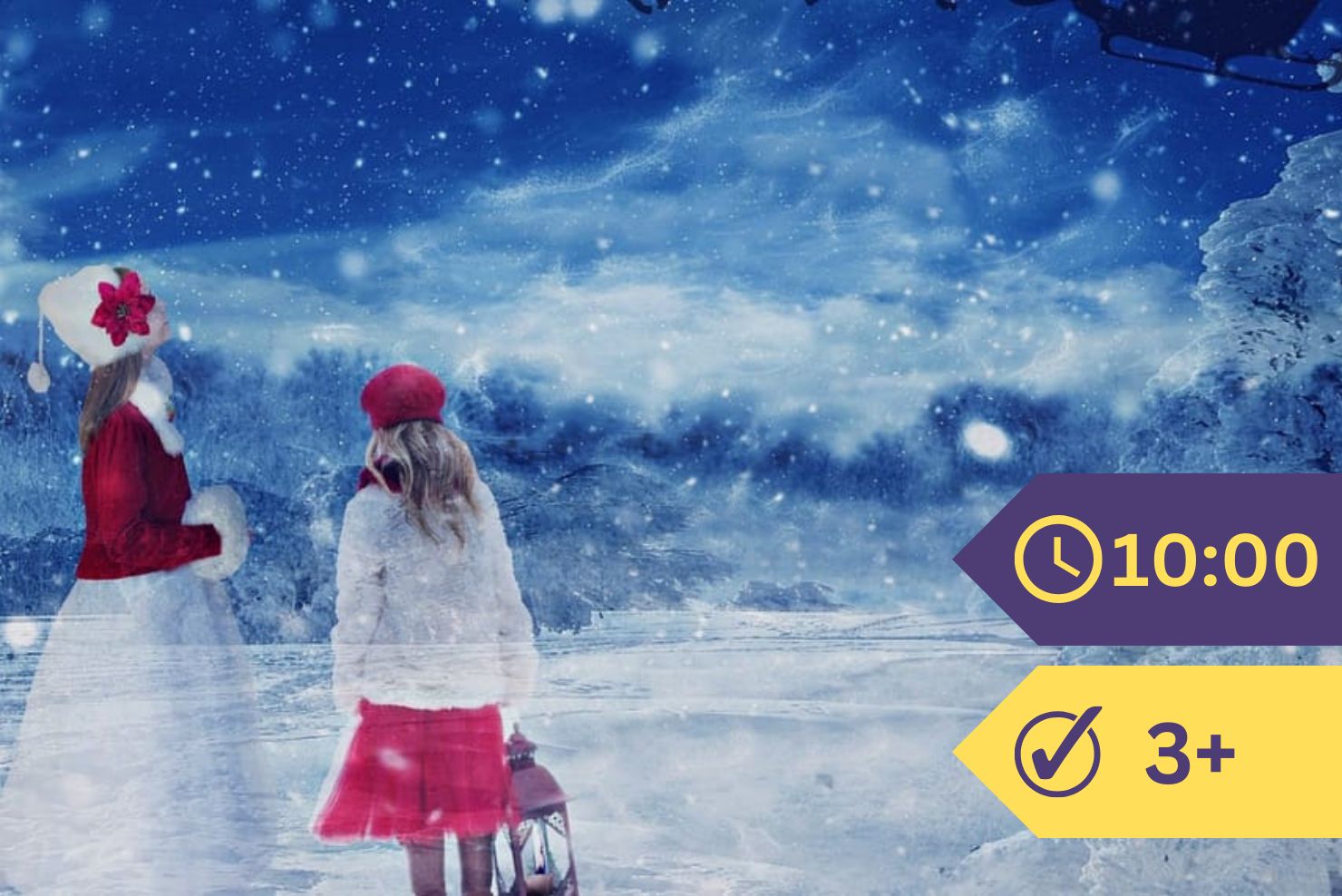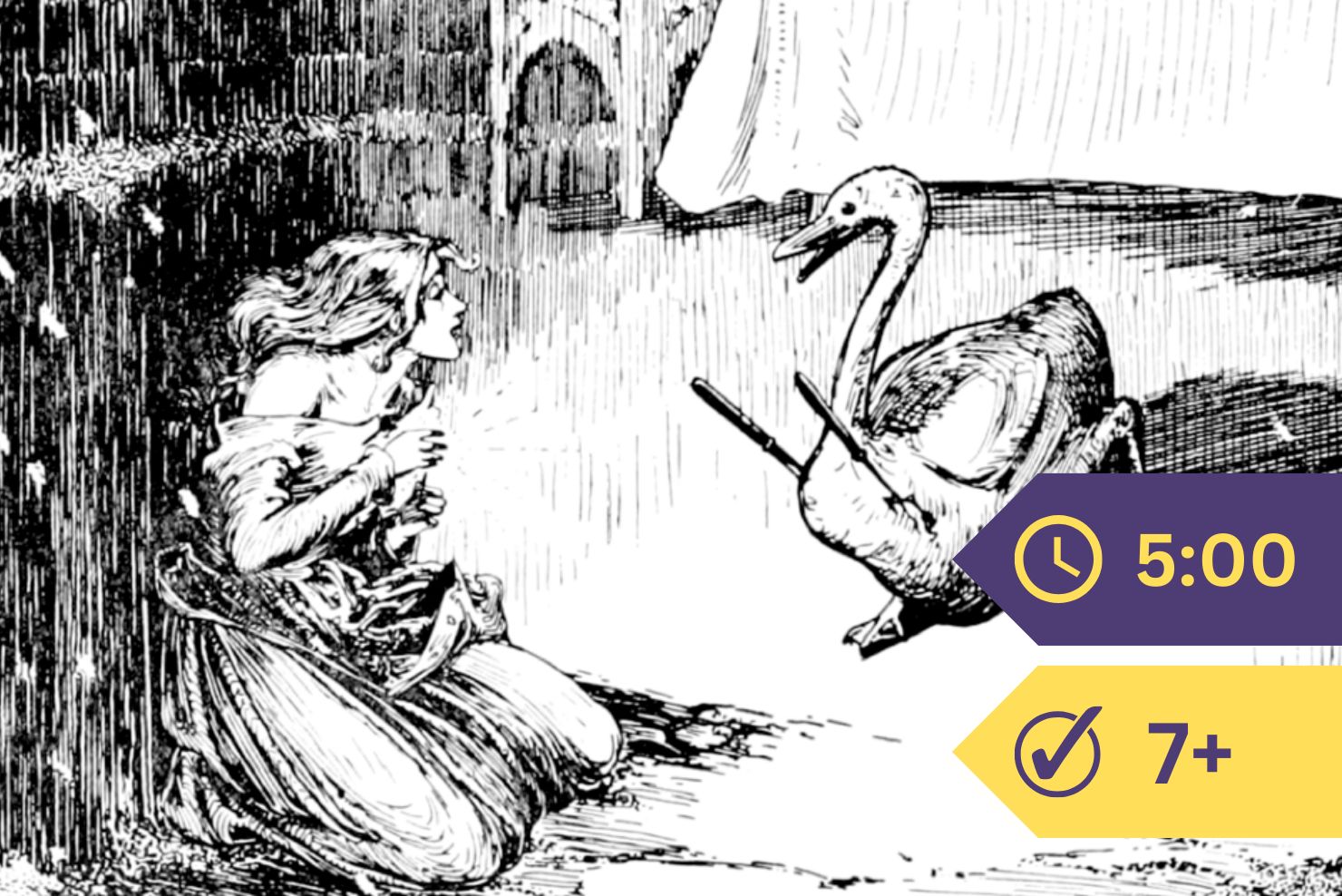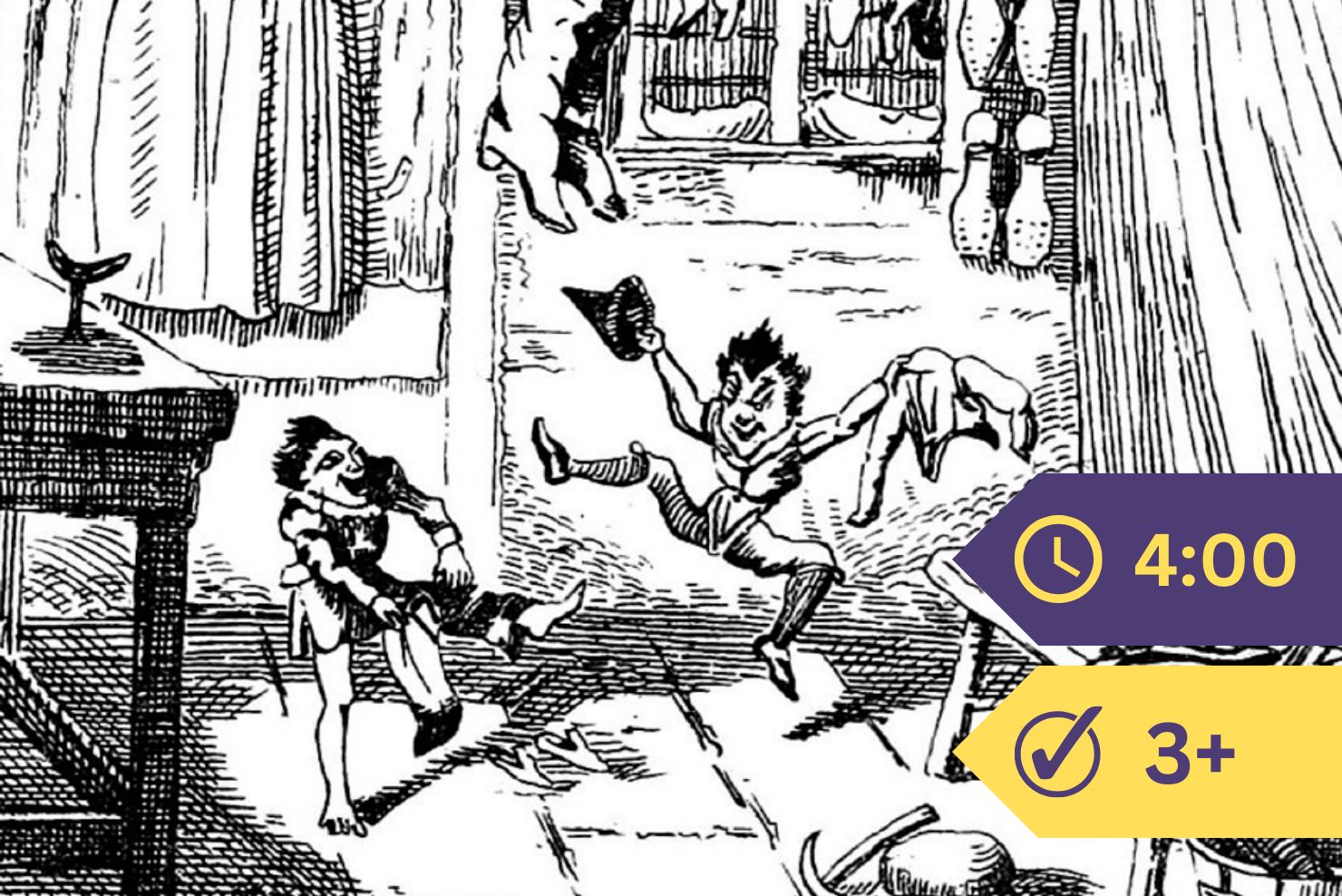King Nutcracker prepared for a great Christmas feast, because Santa Claus had promised his three sons something very special. What do you think it was? A pony or a boat? No, no, Prince Nutcracker and Prince Buttons didn’t need those things, while little Prince Pepin, had everything he wanted. No, Santa Claus had promised them each a wish! What would the princes wish? Nobody knew. The newspapers declared that of course their wishes would be something nice for the people, but the newspaper knew no more of the matter than you or I.
Santa Claus slipped in when nobody saw him. He went to the three princes and said: “Let me hear what you wish for.” All the courtiers stood on their tiptoes, and you could’ve heard a pin drop, they were so anxious to know what the princes wished.
Pepin, though the youngest, being a saucy, spoiled boy, spoke first. “A prince should always have his own way,” said Pepin. “Now there are a great many things that annoy me. Sometimes, when I am flying my kite, there is no wind. Now I think that a prince should always be able to fly his kite: if not, I might as well be any other boy. Also it rains when I am going horseback riding, and the sun sets before I am ready; and my ball tumbles down when I want it to stay up, and sometimes it is too warm, and sometimes it is too cold; in short, there is no end to my annoyances, and I want to regulate these things myself.”
Santa Claus looked hard at Pepin to see if he was serious. Pepin looked back at Santa Claus with a serious face. “Have your wish while you remain a prince,” said Santa Claus.
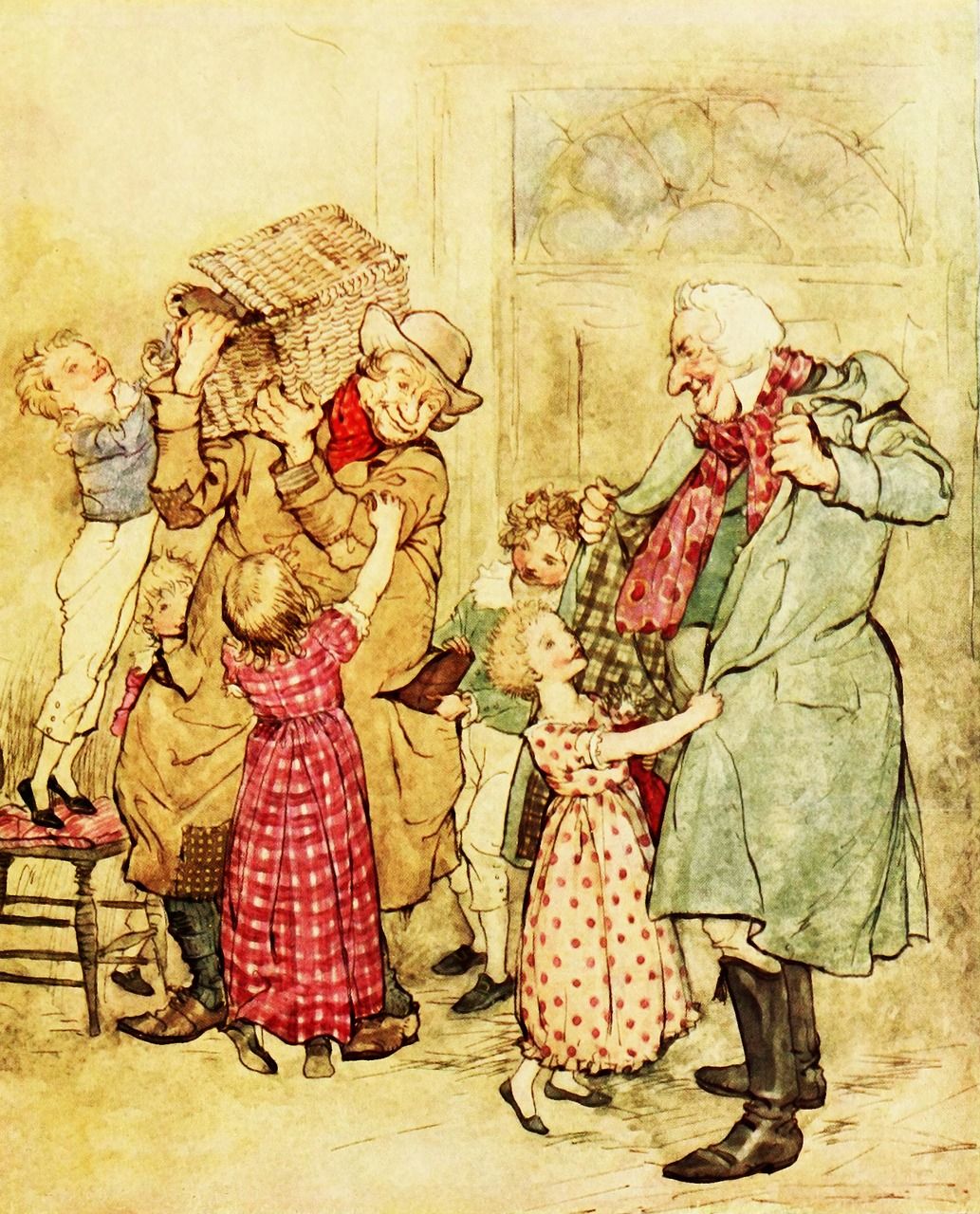
The courtiers stared, but no one had time to make any remarks; for Prince Nutcracker wished for the luck-penny. Now you know whoever has a luck-penny will make money, more money, much money, and will never lose any.
“But there is one objection,” remarked Santa Claus. “By continual use, the luck-penny will be more important to you than anything else.”
“Ok, I don’t care,” said Nutcracker, slipping the luck-penny into his pocket.
Prince Buttons, blushing to the tips of his ears, wished “to marry the shoemaker’s sweet daughter, and that the spirit of Christmas might live in their house the year round.”
The King jumped up, fuming and spluttering: “You idiot! The daughter of the shoemaker and the Christmas spirit? What a stupid thing to wish for!”
His Royal Highness was really angry and the Queen fainted and the courtiers cried. “Oh!” Prince Buttons ran away in the midst of the hubbub; Santa Claus disappeared; and the court suddenly found itself in darkness. It was high noon, but the sun had popped out of the sky like a snuffed-out candle. Nobody could find candles or matches, and there was great confusion in the palace and in the city. People were left standing in darkness at the shops and ferries. People who were eating dinners, and people who were doing shopping, and people who had just come out to see Christmas, were all in darkness. Everybody was scared, but it turned out that it was only Prince Pepin, who wanted to see the Christmas lights, had ordered the sun to set.
The king screamed: “Order the sun up again, and if I catch you doing such a thing again….”
Pepin, who was afraid of his father, did not wait for the rest of the sentence; so, just as everybody had lighted candles, or turned on the gas, there was the sun again. “Seems to me,” said Pepin, sulkily, “I am not having my own way after all,” and he walked away moping to play a game with a ball. The game didn’t go well and he screamed: “Stupid ball! Always falling down!”
“It only obeys the law of gravitation, my dear,” said the Queen.
“I wish there was no law of gravitation,” snapped Pepin.
Whisk! Pepin was flying through the air. Kicking frantically, he saw the King, the Queen, everything, coming after him! Something hit him hard on the nose. He was in a perfect storm of great round apples, flying in all directions! Bang! bump! on his head, in his mouth, on his shoulders! Pepin dodged and squalled; the air was full of stones and timbers; a horse was kicking just over his head; somebody had him by the hair, and somebody else by the legs, for, of course, everybody clutched in all directions to save himself.
“Oh!” screamed Pepin amidst the general uproar of barking, neighing, braying, clucking and shouting, “I wish the law of gravitation was back again.”
At once Pepin, the King, the Queen, and the people, were on their feet. Everything was in its place again,—everybody a little rumpled, but nobody hurt. The newspapers pronounced the affair the best joke of the season; but the people looked very glum over it.
But Pepin found it funny and continued with other jokes. Often, when he was lazy, the sun did not rise until noon. And other times he sometimes kept the sun in the sky till nine o’clock at night, while all the children in the city were crying for sleep. Three nations declared war on King Nutcracker, because of Pepin’s jokes. The farmers were all in despair, for Pepin hardly allowed a drop of rain to fall; and having a fancy for skating in summer, he ruined what harvest there was by a week of ice and snow in July.
Pepin was no longer afraid of his father, since he could leave him at any time in total darkness, so nobody could stop the prince. Then one night there was a loud knocking at the palace gate. There was a mob at the gates; the people, tired of Pepin’s jokes, had rebelled. Prince Nutcracker put his luck-penny in his pocket and walked out of the back door; no one stayed to look after the King and Queen, who were running about in nightcap and slippers, in a terrible fright.
On the next day the newspapers came out with a new heading. It was called now the People’s Journal, and it said that, on the night before, old Mr. and Mrs. Nutcracker and their boy Pepin had escaped, nobody knew how, and nobody cared. So there was no longer a royal family. Prince Nutcracker lived as a commoner and opened a shop in the city. And Buttons had been send away from the palace months before.
As Nutcracker had the luck-penny, of course he made money in his new store. Every day, and all day long, he looked straight at the penny and cared about nothing else. He made money all year round and he gave none of it away. None to Pepin, because he had brought about their misfortunes. None to Buttons, because he might have wished for something better, if he liked, than a holly-bush and the shoemaker’s daughter. None to anybody, because why should not people work and earn money, as he had done, if they wanted it? And every day he grew more and more like his penny,—that is, of less and less use for anything that was not buying and selling. One day Santa Claus came by, he had not seen him in ten years. He heard a sudden jingling of sleigh-bells, he looked up and saw it was Santa Claus coming.
“I stopped my sleigh,” said Santa Claus, “to see if you had anything to give to your father and brothers.”
“Why should I send them anything?” answered Nutcracker.
Santa Claus put his hands down deep in his pockets, as if he was trying to hold himself. “What for! Aren’t you rich and they poor? Your own flesh and blood? If you don’t have the love of a son and a brother, you must feel the Christmas spirit at least once a year in your heart? Urging you to love and be kind towards other people?”
“Well, I don’t” snarled Nutcracker. “If people want things they have to work for it, just like I do! And….”
Nutcracker never finished this speech, because—he could not. A dumb, dry and hard feeling had taken possession of him. His legs were gone and so were his arms. Something wrapped him around. He had a strange notion that he had grown round, and that—it sounds ridiculous—but Nutcracker was quite positive that he was in a table drawer among some coin, and that he was—a copper penny.
He then heard his wife yell: “Mr. Nutcracker, Mr. Nutcracker!” Then he heard his children calling, “Papa, papa!” Then a running up and down stairs. They were searching for him. Then somebody declared that he had disappeared! So they went to the newspapers to put an ad in the papers, taking a handful of money from the drawer, Nutcracker was among the pennies and somebody carried him to a newspaper office, and paid with him as a penny for an advertisement about his own disappearance! Two minutes after, the man at the newspaper gave him in change to a gentleman, who paid him out to a newsboy, who bought an apple with him of a grocer, who gave him in change again to a shoemaker, who dropped him into his soiled and patched pocket, where Nutcracker found nothing else but a five-dollar gold-piece.
This shoemaker was Buttons. Was not this a charming way for two brothers to meet?
The pocket into which Nutcracker dropped was very dirty, but this shoemaker, who walked in the biting wind with no overcoat and his hands in his pockets, had warmth and sparkle in his heart that made Nutcracker feel brighter, though he could not tell why. There were Christmas trees on all corners, and Christmas wreaths piled on the stands, and at every tree and wreath Buttons warmed more and more. There were women going home from market, with a broad grin on their faces and Buttons laughed back at them as he walked, whistling and looking around him. To Nutcracker, Buttons seemed like the happiest man on earth.
All this time Buttons walked very fast and very straight till he came to a certain shop. Outside of this door was a clothes stand, and on this stand hung an overcoat, marked “Only Five Dollars.”
Buttons stopped. “Now,” said he said to himself, “I need an overcoat. I have got five dollars in my pocket. Shall I buy this overcoat? But,” said Buttons, “if I buy it I have no money left to buy a Christmas dinner for my family and mom and dad and Pepin.”
Then he began to count on his fingers: “A dressing-gown for father, a shawl for mother, a new gown for my wife, goodies for the children, a box of paints for Pepin, and the dinner.” Then he gave a little sigh, and, putting his hands again in his pockets, walked away as fast as he came.
Buttons lived upstairs, in a little house in a dirty street. His rooms were small, and they were crowded. There were old Mr. and Mrs. Nutcracker, who never forgot that they had been king and queen, and that Buttons’ wife was a shoemaker’s daughter, and never remembered that Buttons had returned their cruelty with kindness, and I think were not very nice people to live with. There was Pepin, who had been hurt in escaping from the palace, and who had never gotten out of his bed since. There was Buttons’ pleasant-faced wife; there were three fat children; there was the holly-bush, which had grown into a great tree; and there was—Nutcracker did not know what—but something, he was quite sure, for which he had been searching all his life.
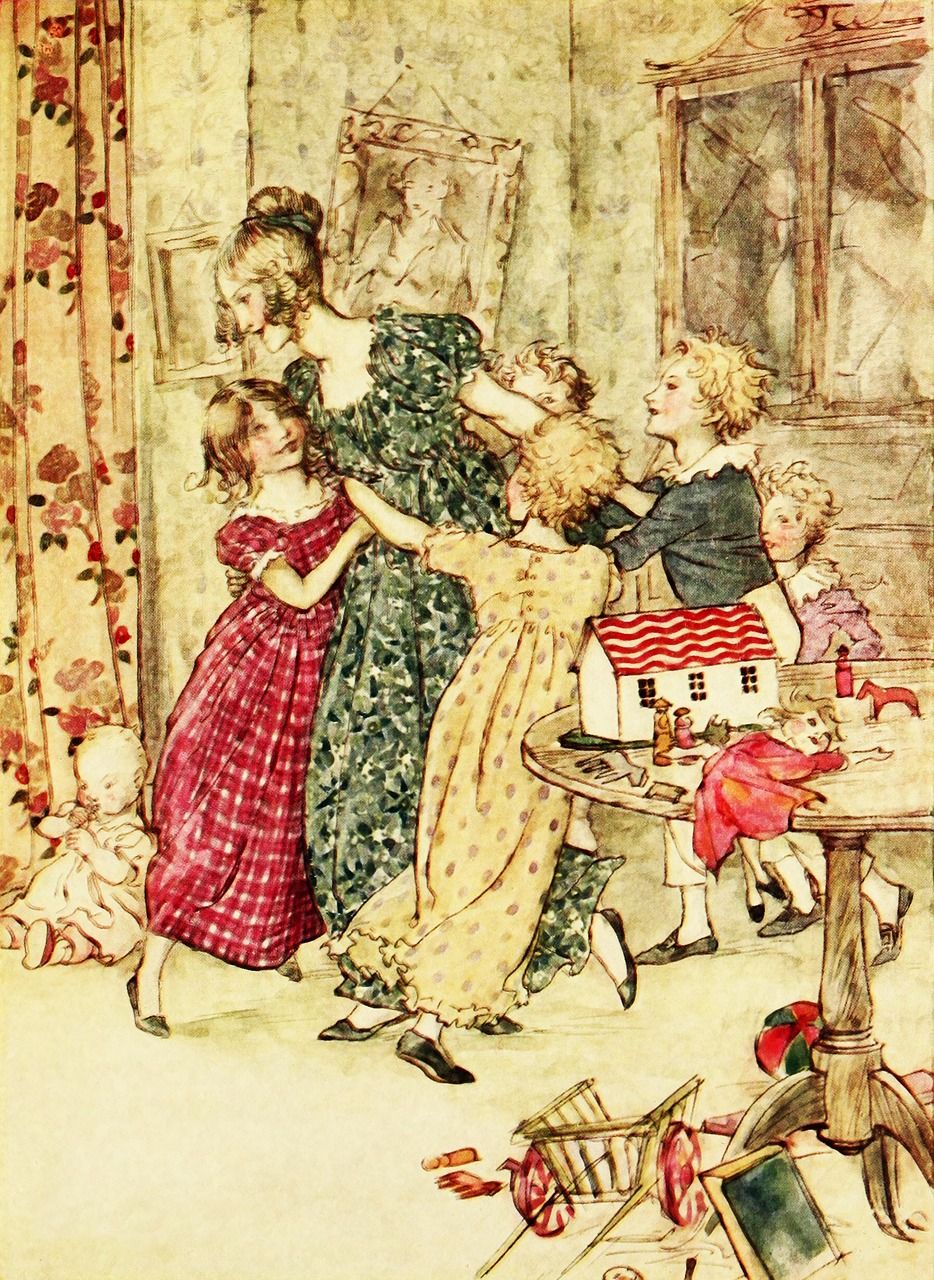
The children ran to their father. “Ah!” said Buttons, pretending to groan. “I am so tired. Can you go out and see it there’s something outside?”
The children opened the door. “Mom, come quick! Here’s a chicken, and cranberries, and raisins!”
“A chicken!” cried old Mrs. Nutcracker.
“Christmas wreaths!” exclaimed his wife, peeping out into the little dark hall. “Why, surely, you never——”
“Made them? Yes, I did,” said Buttons, his eyes dancing. “In the woods. The cedars gave me boughs for nothing.”
“Christmas wreaths!” repeated Pepin from his bed. “Give me one,” and, seizing it in his thin fingers, “Ah! how nice it smells,—like the woods!” he said, laying his pale cheek on it. “I wish I could see a tree once more.”
Buttons jumped up and ran downstairs very fast, and they heard him coming back dragging something after him, bump, bump! The something rustled and cracked and filled the room with a strong, spicy scent of the woods. Buttons lifted it so that it stood just in front of Pepin’s bed. It was a spruce-tree. Its thick, strong branches spread out wide. Its top brushed the ceiling. Birds had built nests in its branches, mosses had lived about its roots. It knew all the secrets of the woods and the sky and the rains, and it told you about them, as well as it could, whenever you stirred its branches. The wife hung the wreaths all about the room,—one on every nail, one over each window, one over Pepin, one each on the backs of grandpa’s and grandma’s chairs. It was getting dark, and the firelight came out and danced on the ceiling and on the white cover of the little table. Pepin lay looking at the tree. The children chattered like little birds; even Grandpa and Grandma Nutcracker were smiling. What was it, Nutcracker wondered more and more, here in these people’s faces for which he had laboured all his life?
Suddenly Pepin cried out, “O, there is something here hanging on a branch of the tree!” Pepin took it down. “Why, it is for me,” he said, looking at the name on the wrapper.
“Then you better open it,” answered Buttons. Pepin untied the string, but his hands shook. “It is square,” he said, feeling it. He took off one wrapper. “It is hard,” he said again. He took off the second wrapper, and it nearly dropped from his fingers.
“A box of paints!” screamed the children, dancing around. And everybody was happy.
As for Nutcracker, he had a curious tingling sensation all over him, though he was only a copper penny; and when he looked at the fireplace, he saw Santa Claus. The old fellow had tied up his reindeer and slipped down the chimney, and was winking hard, and wiping his eyes, while pretending to blow his nose.
“I have it! I have got it, and know what it is!” cried Nutcracker, at the top of his lungs. “The Christmas spirit lives here all the year round, and these people love one another, and are happy. That is what I never had at home—happiness; that is what my money could not buy. That is why I was every day trying to make more money—always hoping to make money enough to buy it.”
And in some mysterious way, Nutcracker found himself on his legs again, and he was walking as fast as he could with a pocketful of money, to buy a monstrous turkey, and the best overcoat in the city, and boots and a hat to match, and a new gown, and a dressing-gown, and a shawl and a set of paints, and a great bouquet, and a basket of toys, and candies—for whom? Why, for Buttons, and Grandpa and Grandma Nutcracker, and the pleasant little wife, and Pepin, and the children, of course!

